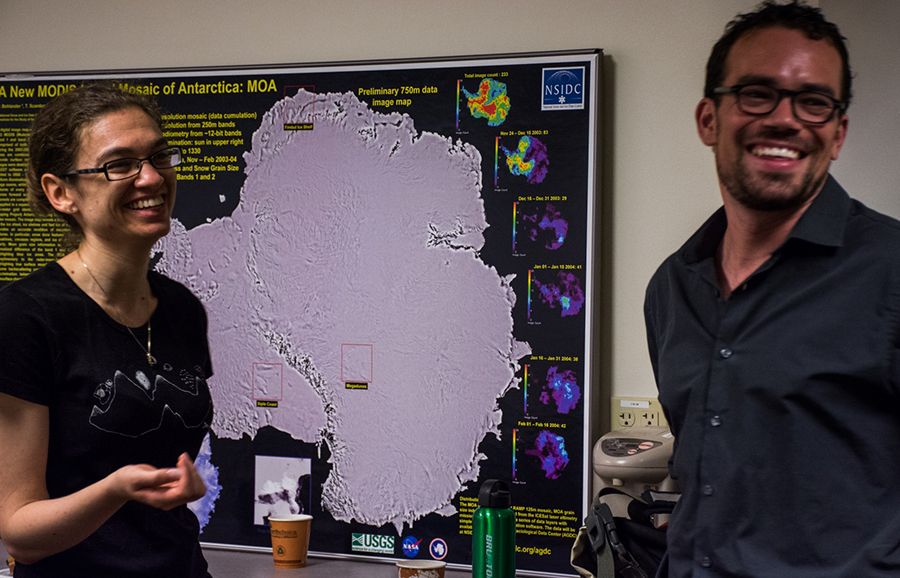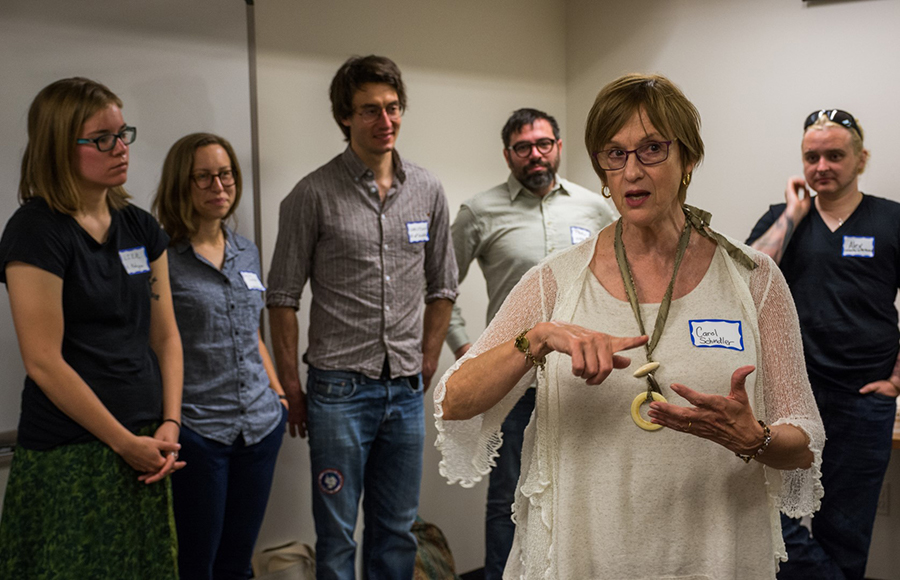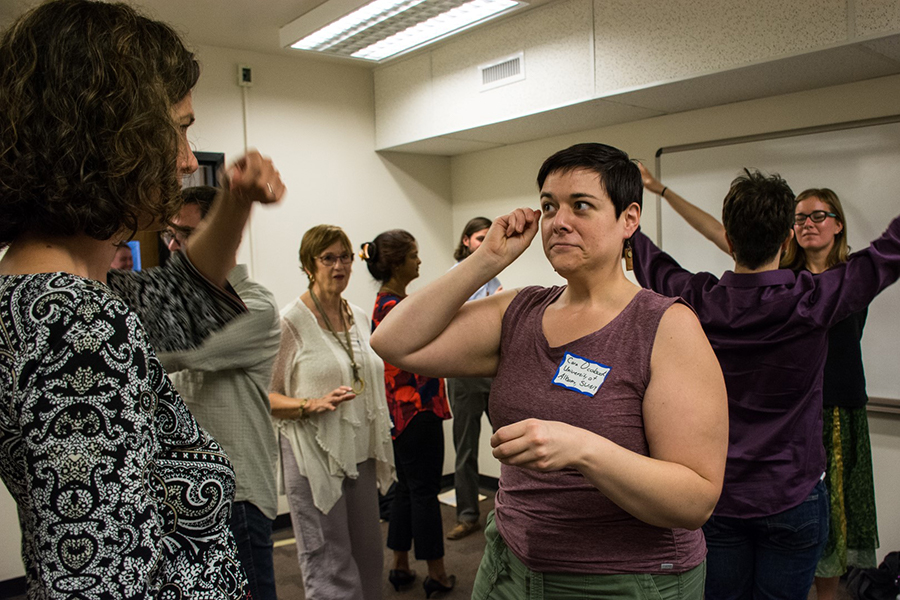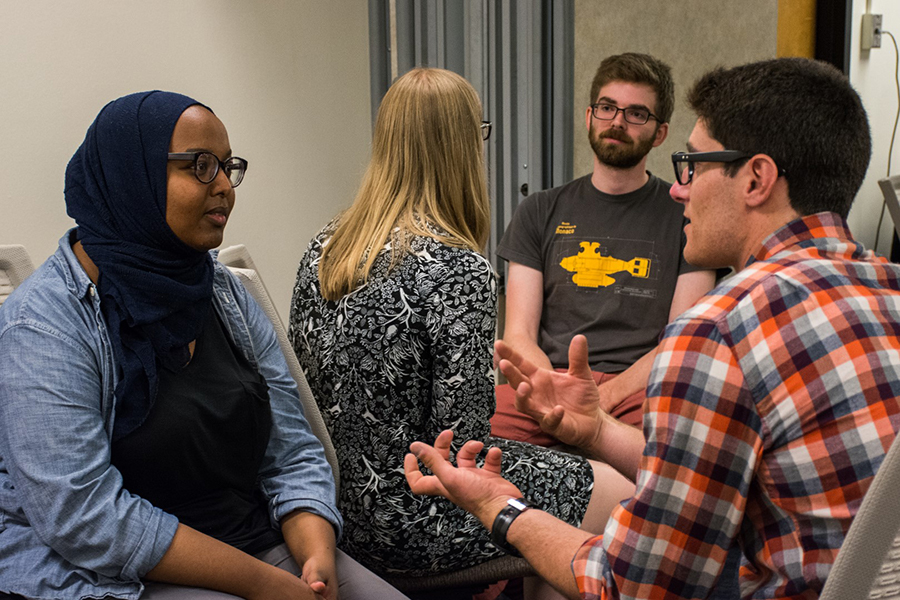
Photo Credit: Mike Lucibella
|
Angela Bliss (left) and Matthew Drucker share a laugh while they practice skills they learned at the communications workshop.
|
Talking Science with the General Public
By Mike Lucibella, Antarctic Sun Editor
Posted October 17, 2017
Scientists spent a long weekend in August learning how not to talk like a scientist.

Photo Credit: Mike Lucibella
Carol Schindler from Stony Brook instructs researchers about ways to actively engage their audience when talking about science.

Photo Credit: Mike Lucibella
Yarrow Axford (left) and Cara Ocobock use techniques borrowed from improv comedy to practice interacting with their audience to better share their science.
Educators from the Alan Alda Center for Communicating Science and the University of Colorado, Boulder trained a class of 32 early career polar scientists on techniques to share their science with the general public.
Funded by the National Science Foundation and NASA, the workshop brought the researchers together for three days of interactive training so they could learn new skills to communicate their knowledge and expertise broadly.
"It's your responsibility to tell [the general public] what you're doing and why it's important," Christine O'Connell, a science communications educator from Stony Brook University, told the workshop attendees.
Headquartered at Stony Brook University on Long Island, New York, the Alan Alda center's mission since 2009 has been to teach scientists and researchers communication skills. Founded by actor Alan Alda, star of the TV show M*A*S*H and former host of Scientific American Frontiers, the center sends its trainers to more than 100 different workshops across the country each year.
"People had different goals coming in," said Allen Pope, a postdoc at the National Snow and Ice Data Center who helped organize the workshop at CU Boulder. "Some were super new coming in while some had some experience."
"It's your responsibility to tell [the general public] what you're doing and why it's important"
The students practiced being interviewed by the media, storytelling, writing research summaries and even one-on-one engagement using techniques borrowed from improvisational comedy classes.
"We're using tools from improvisation. We're not here to turn you into actors," said Lydia Franco-Hodges, a science communications educator from Stony Brook. "We're not trying to be funny."
The trainers emphasized that to communicate well, researchers need to listen and know their audience to be sure that their message is getting through.
"Communication doesn't actually happen until the other person gets what you're saying," O'Connell said.
She added that the communications skills they were teaching has a wide range of applications, including when attendees when applying for grants, working with policymakers and even when corresponding with other researchers to disseminate new data and results.
"[Otherwise] the scientific process doesn't work, it becomes stagnant," O'Connell said.

Photo Credit: Mike Lucibella
Danya AbdelHameid (left) and Sasha Leidman practice sharing and explaining their research to people who may not have a background in polar science.
A big part of the training was to discourage researchers from using obscure scientific terms and instead opt for plain language and metaphors whenever possible.
"Everyone has their own specialized jargon and specialized knowledge," O'Connell said. "You have to remember what it's like not to know."
Participants said there was much they were able to learn from the workshop.
Grant MacDonald of the University of Chicago said he took away the importance of "making a connection with the audience and not leaving them behind [as well as] finding a hook, a commonality to get them interested."
Other attendees said they picked up similar skills and planned on using them in a variety of ways.
"I'm really interested in communicating science, especially now that I'm a science professor and teaching," said Kerry Nickols, a biology professor who recently started teaching at California State University, Northridge. "It's something I haven't had a lot of formal training in."
She added that the skills she learned for communicating with the general public will be helpful when teaching her students.
"As scientists, there's much we learn about how to do science, but there's so much more," Pope said. "These are communication skills that are important no matter what you're doing."
To further spread what they learned, two participants participated in a special science communications panel at the International Glaciological Society's annual meeting immediately following the workshop. The workshop participants shared what they learned to the crowd of glaciologists and climatologists.








